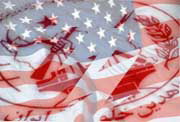The U.S. military will relinquish control of a base near a compound housing an Iranian opposition group next month, a move that will close a chapter on one of the most intractable issues in U.S.-Iraqi relations.

The presence of the People’s Mujahedeen Organization of Iran at Camp Ashraf has long been an irritant to Iraq’s Shiite-led government, and the exiles expressed fear that they would face violence without the Americans there to protect them.
The announcement Thursday of the base closure on July 1 came nearly a year after Iraqi security forces raided the camp, prompting a melee that officials said left 11 residents dead and dozens injured.
The U.S. military guarded the camp since the fall of Saddam Hussein in 2003 under an agreement that made its more than 3,000 residents "protected persons" under the Geneva Conventions. The military stopped observing the agreement after a new security accord with the Baghdad government took effect last year but maintained the nearby base.
U.S. military spokesman Lt. Col. Bob Owen said Thursday that the closure of the base known as Camp Grizzly is part of the transition as American forces prepare to leave the country by the end of next year.
"U.S. forces will continue to reduce our footprint in Iraq, and this is another base that will be turned over to the (Iraqi government) as we continue our transition to stability operations," he said.
Members of the Iranian faction, which fought with Saddam Hussein’s forces against Tehran in the 1980-88 Iraq-Iran war, have made several claims about a host of alleged abuses and pressure tactics by Iraqi authorities who are eager to oust them from the country.
Ashraf’s residents are very reluctant to leave the camp because of fear of being detained and threatened with deportation.
Iraqi officials could not immediately be reached for comment. In the past, the government has said the exiles will not be forcibly returned to Iran, where the Islamic leadership considers the People’s Mujahedeen, or MEK, an enemy of the state.
The United States lists the MEK as a terrorist organization, though one that has provided the Americans with intelligence on Iran. The European Union removed it from its terror list last year.
A member of the European Parliament sent a letter this week to U.S. Secretary of State Hillary Rodham Clinton raising concern about a U.S. departure from the area.
Struan Stevenson, the European Parliament’s point man on relations with Iraq, warned it would "be an extremely dangerous development that could lead to a new humanitarian catastrophe with far greater dimensions compared to the events of last July."
Shahriar Kia, a spokesman for the group who lives at the camp, expressed fears about the future.
"The American government is responsible for the future of the people in this camp," he said in a telephone interview from the camp. "This will give a green light to the Iranian regime for any future attack especially when a new government in Iraq hasn’t been established."
Iraqi politicians are jockeying over the formation of a new government after inconclusive elections on March 7.
Iraq’s two largest Shiite political blocs signaled Thursday that their alliance is still strong by giving it a name, keeping them on track to form the core of the country’s new government.
The alliance between Prime Minister Nouri al-Maliki’s State of Law coalition and the hard-line religious Iraqi National Alliance was created more than a month ago. But there have been no outward signs of progress on key steps toward forming the government such as bringing in other partners that would give them a ruling majority in parliament or naming a candidate for the top government job, prime minister.
With behind-the-scenes negotiations moving slowly, there has been speculation in the Iraqi media that the alliance might not last.
But in a sign of its strength, lawmaker Khalid al-Attiyah said Thursday the union will now be called "National Alliance."
He said the coalition would have 159 seats in 325-member parliament, still four seats shy of a ruling majority.
No group won an outright majority in the parliamentary election, but the rival Sunni-backed Iraqiya list claims it should be allowed to form a government because it won the most seats, with 91 compared to State of Law’s 89.
Parliament must still formally approve the National Alliance as a recognized coalition after it convenes for the first time on Monday. Lawmakers will also elect a new president, who will task the largest bloc with forming the new government — including designating a prime minister, Cabinet officials and awarding other top political jobs to supporters.
——
Associated Press Writers Qassim Abdul-Zahra, Hadeel al-Shalchi and Lara Jakes contributed to this report
